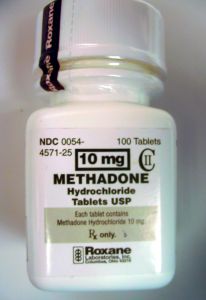Over on the South Carolina Child Injury Lawyer Blog, your Charleston, SC lawyers at Christmas Injury Lawyers have been discussing pharmacy errors and resulting serious injuries and deaths from those errors. Recently your Charleston personal injury attorney read about a lawsuit in which a jury will decide if a woman is unable to work because she stopped breathing and suffered brain damage resulting from oxygen deprivation after a physician allegedly over prescribed methadone for pain or whether her injury stemmed from other medical conditions. The 59-year-old woman sued the physician three years ago and is seeking $2 million in damages.
The woman had worked for the Maine Department of Health and Human Services for 18 years when she decided to take a medical leave of absence in 2006 to deal with her chronic back pain. Around that time her primary care physician referred her to the defendant in this case. The defendant was using Prolotherapy to treat patients with chronic pain. The treatment included injections into the area around her spine that, according to the Prolotherapy website (www.prolotherapy.org), caused localized inflammation designed to promote “a wound healing cascade.” The defendant prescribed methadone for the pain resulting from the treatment on August 30, 2006.
According to reports, 48 hours later the woman’s fiancé awoke in the middle of the night realizing she had stopped breathing. He was able to revive her but the woman suffered brain damage that affected her ability to multitask and perform tasks that require a high level of brain functioning. The types of things jobs require, her medical malpractice attorney told the jury. He went on to tell jurors, “Before the brain injury, she was the caretaker in the family. Now she needs taking care of.”
Plaintiff’s attorney also made jurors aware that a pretrial screening panel found the defendant had deviated from the standard of care and that his deviation had caused plaintiff’s injuries. A pretrial screening panel is required in all medical malpractice cases in the State of Maine. For informational purposes, pretrial screening panels, like most alternative dispute resolution mechanisms, operate to encourage parties to settle meritorious claims and to deter or eliminate discreditable suits.
By contrast, defense counsel told the jury of six men and four women that the plaintiff never mentioned to the pharmacist that she had previous breathing problems and suffered from sleep apnea. Both conditions make it ill advised to take a narcotic such as methadone. In addition, the defense maintained that because the woman never intended to work she was not entitled to compensation for future lost income. Defense counsel also advised jurors “The Plaintiff has the burden of proving malpractice.”
Burden of proof is a legal duty resting upon a party litigant. It is the obligation placed upon a party to prove or disprove a disputed fact. Generally, the burden of proof is satisfied by evidence. In this case, the disputed fact would be the cause of the debilitating brain damage. Was it because the woman was overprescribed methadone, or was the injury a result of previous medical conditions? That question is to be determined by the jury who recently concluded deliberations on the facts of the case, weighing the credibility of evidence presented by both parties.
In the end, the jury took a little less than two hours to return a unanimous verdict in favor of the plaintiff and awarded her $1.9 million in damages. The plaintiff’s medical malpractice lawyer noted that such a verdict is valuable to more than just his client in that “it will make doctors more careful, patients safer, and benefit the community in safe prescribing.” According to reports, counsel for the defense did not comment on the verdict, and it is not clear whether or not they plan to appeal.


